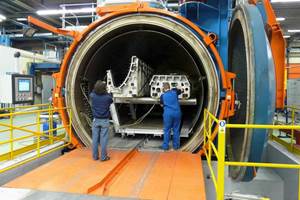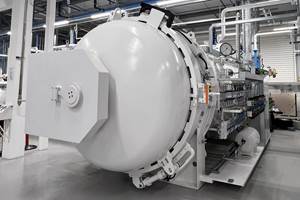Weber Manufacturing expands, buys huge machine
Weber has recently installed an innovative, high-speed 5 axis machining center, a 2017 DMU 340 P Unimould by DMG Mori (Bielefeld, Germany), the first of its kind in Ontario and just the third such machine in North America.
Today’s manufacturing customer demands world class precision tooling and exceptional customer service, says Weber Manufacturing Technologies Inc. (Midland, Ontario, Canada), who says it is perfectly positioned to deliver those requirements to customers from its Ontario facility. Weber has recently installed an innovative, high-speed 5 axis machining center, a 2017 DMU 340 P Unimould by DMG Mori (Bielefeld, Germany), the first of its kind in Ontario and just the third such machine in North America.
Weber president Chris Edwards says the DMU 340 is the focal point of an $8 million capital investment plan propelling the company forward in an increasingly competitive global market: “It helps us deliver outstanding accuracy and superior speed to market to our automotive, aerospace and home and building product customers.” The DMU 340 is a key piece of a significant capital investment plan that was spurred on by a recent $800,000 South Western Ontario Development Fund grant.
The DMU 340’s massive 3.4m diameter table can easily handle metal blocks weighing up to 20,000 kg, and the machine, which can both cut and measure, completes the cutting from the top down in one setting, eliminating the need to reposition and reset the piece during production, explains Edwards: “What takes 48 hours with a 3-axis machine is completed in 24 hours with the DMU340,” explains Edwards. Increased speed also comes with improved accuracy, he adds: “Older models simply can’t perform like the new machine which builds to an incredibly fine detail.” Weber has already secured two Chinese customers, and is currently working on a tool for a Chinese-made car.
The four-year growth plan will see the addition of several other critical machines including:
- Two 2017/2018 DMU 85 MonoBlock 5 axis machining centers for blocks up to 800 kg, with an automatic three-pallet changer;
- Two 2017 FIRST small milling machines to increase small component capacity and assist with skilled trades development;
- A 2017 Piranha Ironworker to provide faster turnaround of fabrication components, bending steel and punching holes;
- A universal medium duty 5-axis gantry machine;
- A second Nickel Vapour Deposition reactor to double the company’s nickel shell and powder production capacity; and
- A 2000-ton production press for increased capacity on Weber’s fiberglass door line.
“Weber is growing and this very significant capital investment further expands our ability to partner with our customers and better serve their needs,” says Edwards. “This vital investment in advanced technology increases our exports, increases sales and creates jobs. It helps us structure our business and properly prepares us for the next step in our growth, including expanding our plant.”
The existing 12,542m2 of production space is already home to innovative technology like the world’s largest Nickel Vapour Deposition facility for precise replication of intricate detailing in production molds. NVD is capable of producing nickel shapes in 99.98% pure nickel with high precision, for molds or complex nickel components, including fine surface detail, grains and textures. Tools made using NVD nickel shells offer many flexible design options and critical advantages not available with any other tool-making, explains Edwards.
Advanced technology requires a highly trained and skilled workforce and Edwards stresses Weber’s workforce is its most valuable asset: “We are committed to maintaining the integrity of our workforce by investing in skilled trade development, including supporting our employees with full wages while attending apprenticeship schooling. We also provide in-house training on machining centers, and support the local colleges and OYAP programs to encourage students into skilled trade programs.”
Weber is a fully integrated mold manufacturer serving a diverse group of customers over three markets including automotive interiors & exteriors, aerospace, and home and building products. Founded in 1962, Weber builds tooling for spray, slush, IMG/Negative Vacuum Forming, compression, injection, RTM, infusion, autoclave and out-of-autoclave processes. The in-house model shop develops Master Models made from leather wrap or select wood grains and can also provide low cost models in silicone, epoxy and urethane tooling board.
Related Content
Plant tour: Airbus, Illescas, Spain
Airbus’ Illescas facility, featuring highly automated composites processes for the A350 lower wing cover and one-piece Section 19 fuselage barrels, works toward production ramp-ups and next-generation aircraft.
Read MorePlataine unveils AI-based autoclave scheduling optimization tool
The Autoclave Scheduler is designed to increase autoclave throughput, save operational costs and energy, and contribute to sustainable composite manufacturing.
Read MoreBusch expands autoclave solutions
Busch announces its ability to address all autoclave, oven and associated composites manufacturing requirements following the acquisition of Vacuum Furnace Engineering.
Read MoreAdvanced autoclaves, ovens provide efficiency, precision and intelligent control
CAMX 2025: Olmar is highlighting its next-gen autoclaves and industrial ovens for composites curing to improve throughput, scale production and achieve tighter quality control.
Read MoreRead Next
Cutting 100 pounds, certification time for the X-59 nose cone
Swift Engineering used HyperX software to remove 100 pounds from 38-foot graphite/epoxy cored nose cone for X-59 supersonic aircraft.
Read MoreUltrasonic welding for in-space manufacturing of CFRTP
Agile Ultrasonics and NASA trial robotic-compatible carbon fiber-reinforced thermoplastic ultrasonic welding technology for space structures.
Read MoreScaling up, optimizing the flax fiber composite camper
Greenlander’s Sherpa RV cab, which is largely constructed from flax fiber/bio-epoxy sandwich panels, nears commercial production readiness and next-generation scale-up.
Read More












